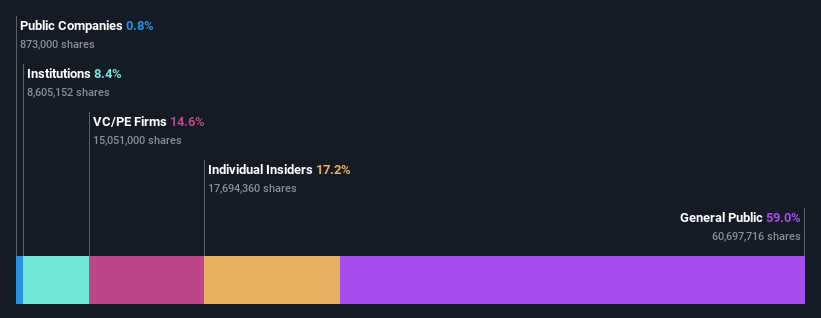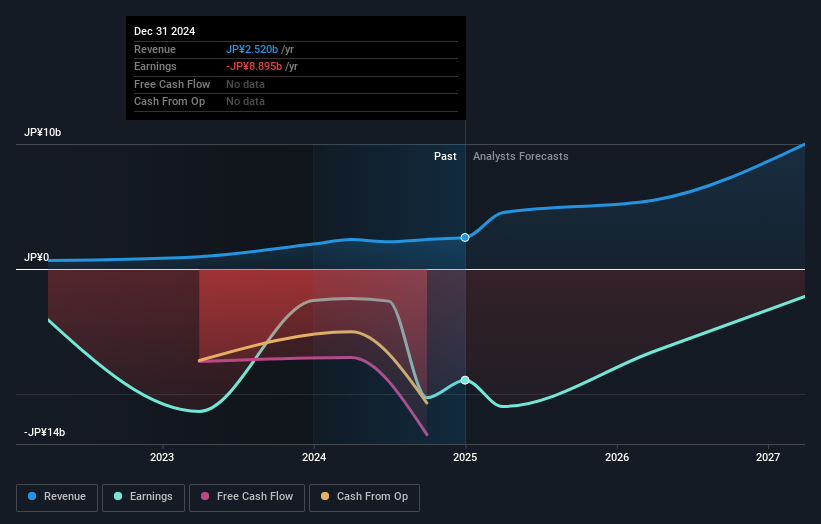- Japan
- /
- Aerospace & Defense
- /
- TSE:9348
ispace, inc.'s (TSE:9348) market cap dropped JP¥8.9b last week; Individual investors bore the brunt

Key Insights
- ispace's significant individual investors ownership suggests that the key decisions are influenced by shareholders from the larger public
- A total of 24 investors have a majority stake in the company with 46% ownership
- Insider ownership in ispace is 17%
Every investor in ispace, inc. (TSE:9348) should be aware of the most powerful shareholder groups. And the group that holds the biggest piece of the pie are individual investors with 59% ownership. That is, the group stands to benefit the most if the stock rises (or lose the most if there is a downturn).
While the holdings of individual investors took a hit after last week’s 12% price drop, insiders with their 17% also suffered.
Let's delve deeper into each type of owner of ispace, beginning with the chart below.
See our latest analysis for ispace

What Does The Institutional Ownership Tell Us About ispace?
Institutional investors commonly compare their own returns to the returns of a commonly followed index. So they generally do consider buying larger companies that are included in the relevant benchmark index.
ispace already has institutions on the share registry. Indeed, they own a respectable stake in the company. This implies the analysts working for those institutions have looked at the stock and they like it. But just like anyone else, they could be wrong. It is not uncommon to see a big share price drop if two large institutional investors try to sell out of a stock at the same time. So it is worth checking the past earnings trajectory of ispace, (below). Of course, keep in mind that there are other factors to consider, too.

We note that hedge funds don't have a meaningful investment in ispace. Looking at our data, we can see that the largest shareholder is the CEO Takeshi Hakamada with 12% of shares outstanding. In comparison, the second and third largest shareholders hold about 9.0% and 5.6% of the stock.
A deeper look at our ownership data shows that the top 24 shareholders collectively hold less than half of the register, suggesting a large group of small holders where no single shareholder has a majority.
While studying institutional ownership for a company can add value to your research, it is also a good practice to research analyst recommendations to get a deeper understand of a stock's expected performance. There is a little analyst coverage of the stock, but not much. So there is room for it to gain more coverage.
Insider Ownership Of ispace
The definition of an insider can differ slightly between different countries, but members of the board of directors always count. The company management answer to the board and the latter should represent the interests of shareholders. Notably, sometimes top-level managers are on the board themselves.
Insider ownership is positive when it signals leadership are thinking like the true owners of the company. However, high insider ownership can also give immense power to a small group within the company. This can be negative in some circumstances.
Our information suggests that insiders maintain a significant holding in ispace, inc.. Insiders own JP¥11b worth of shares in the JP¥65b company. This may suggest that the founders still own a lot of shares. You can click here to see if they have been buying or selling.
General Public Ownership
The general public, who are usually individual investors, hold a substantial 59% stake in ispace, suggesting it is a fairly popular stock. This size of ownership gives investors from the general public some collective power. They can and probably do influence decisions on executive compensation, dividend policies and proposed business acquisitions.
Private Equity Ownership
With an ownership of 15%, private equity firms are in a position to play a role in shaping corporate strategy with a focus on value creation. Some investors might be encouraged by this, since private equity are sometimes able to encourage strategies that help the market see the value in the company. Alternatively, those holders might be exiting the investment after taking it public.
Next Steps:
It's always worth thinking about the different groups who own shares in a company. But to understand ispace better, we need to consider many other factors. Be aware that ispace is showing 2 warning signs in our investment analysis , and 1 of those can't be ignored...
If you would prefer discover what analysts are predicting in terms of future growth, do not miss this free report on analyst forecasts .
NB: Figures in this article are calculated using data from the last twelve months, which refer to the 12-month period ending on the last date of the month the financial statement is dated. This may not be consistent with full year annual report figures.
Valuation is complex, but we're here to simplify it.
Discover if ispace might be undervalued or overvalued with our detailed analysis, featuring fair value estimates, potential risks, dividends, insider trades, and its financial condition.
Access Free AnalysisHave feedback on this article? Concerned about the content? Get in touch with us directly. Alternatively, email editorial-team (at) simplywallst.com.
This article by Simply Wall St is general in nature. We provide commentary based on historical data and analyst forecasts only using an unbiased methodology and our articles are not intended to be financial advice. It does not constitute a recommendation to buy or sell any stock, and does not take account of your objectives, or your financial situation. We aim to bring you long-term focused analysis driven by fundamental data. Note that our analysis may not factor in the latest price-sensitive company announcements or qualitative material. Simply Wall St has no position in any stocks mentioned.
About TSE:9348
ispace
A lunar resource development company, engages in designing and building lunar landers and rovers to transport customer payloads to the moon.
Low with limited growth.
Market Insights
Community Narratives


